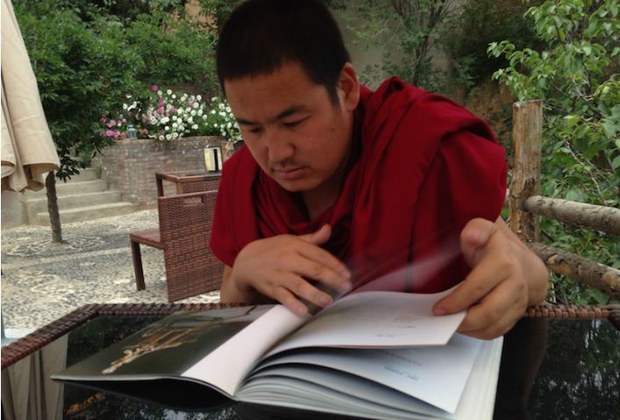Prominent Tibetan writer confirmed detained after year-long disappearance
Share

Rongwo Gangkar in an undated photo.
Prominent Tibetan writer and scholar Rongwo Gangkar, who went missing more than a year ago, has been confirmed arrested by Chinese authorities, RFA’s Tibetan Service has learned.
Gangkar, the 48-year-old author of such popular works as “The Knot” and “An Interview with Gendun Choephel,” a collaboration with other writers, was likely detained in early 2021, a Tibetan source living in Tibet told RFA, speaking on condition of anonymity for fear of reprisal.
“He was unexpectedly arrested by the Chinese police and right now his whereabouts and condition remain unknown,” said the source.
“He was missing since the beginning of 2021, but we only later learned from a few of his friends and acquaintances that he was suddenly taken into custody on the orders of the Chinese government. Few were aware of his arrest, due to tight restrictions in place because of COVID-19 at the time.”
Another source in the region, who also declined to be named, told RFA he was saddened to learn of Gangkar’s arrest and is concerned for his well-being.
“Rongwo Gangkar is a well-known Tibetan writer known for many of his popular works,” he said.
“He is from Rebkong (in Chinese, Tongren) [county in the Malho (Huangnan) Tibetan Autonomous Prefecture] and belongs to Rongwo monastery. … I haven’t seen him for so long.”
Crackdown on Tibetan leaders
Gangkar, who is also celebrated for his skill as a translator, is the latest confirmed victim of a crackdown by Chinese authorities on Tibetan intellectuals and cultural leaders.
Last month, RFA learned that Tibetan writer and poet Gendun Lhundrub, who was held incommunicado for more than a year after his arrest in 2020, is being detained in a prison in Siling (Xining).
The former monk at Rongwo monastery had been monitored by authorities for signs of political dissent before being detained and was arrested in western China’s Qinghai province while he was on his way to attend a religious debate in Rebgong.
Lhundrub is reportedly undergoing political re-education and must translate Tibetan Buddhist scripts into Mandarin Chinese, which the Chinese Communist Party requires be used to teach Tibetan Buddhist studies.
Chinese authorities have frequently detained Tibetan writers and artists who promote Tibetan national identity and culture — with many sentenced to lengthy prison terms — following region-wide protests of Chinese rule that swept Tibet and Tibetan areas in western provinces of China in 2008.
Language rights have become a particular focus for Tibetan efforts to assert national identity in recent years, with informally organized language courses typically deemed “illegal associations” and teachers subject to detention and arrest, sources say.
Translated by Tenzin Dickyi. Written in English by Joshua Lipes.







